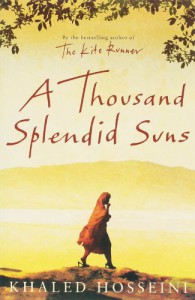

It was a warm, sunny day in Montenegro and I was about to set out on a boat trip. I felt certain that a combination of sightseeing and the people I was with would keep me from having much time to read, but I packed a book anyway just in case there was time for a chapter or two in between stops. [b:A Thousand Splendid Suns|128029|A Thousand Splendid Suns|Khaled Hosseini|http://d202m5krfqbpi5.cloudfront.net/books/1345958969s/128029.jpg|3271379] happened to be that book. And at the end of the day, when I staggered off that boat, blinking at my sudden exposure to reality, it wasn't because I'd been mesmerised by the stunning architecture and history lessons, no, it was because Hosseini stomped all over my heart and had me tearing through pages like a madwoman. I'm not even sure how I found enough hours in the day to take a boat trip around Montenegro and read this entire novel, but somehow I finished this in the few hours I had... simply because I had to.
My initial reaction was a furious, teary promise to myself that I would have to give this book five stars - I think it's impossible for the mind to win a battle with the heart in that level of heat, especially when you're used to English weather. But afterwards, I managed to reclaim some of my sense and sanity, which is when I finally began to acknowledge this book's limitations. For one thing, I think it's extremely generous to place this book in the "literary fiction" category when I'm not so sure it belongs there. Please be aware, I am not complaining and I am certainly not a book snob, give me a delicious page-turner over some pretentious waffle any day. But I find myself comparing [b:A Thousand Splendid Suns|128029|A Thousand Splendid Suns|Khaled Hosseini|http://d202m5krfqbpi5.cloudfront.net/books/1345958969s/128029.jpg|3271379] to another book about a country, culture and history I was only vaguely familiar with - [b:The Poisonwood Bible|7244|The Poisonwood Bible|Barbara Kingsolver|http://d202m5krfqbpi5.cloudfront.net/books/1327881914s/7244.jpg|810663] - a book which I also read on my trip. The latter is a far more complex, ambitious work that brings something which, to me, felt entirely fresh and original. Hosseini's story, on the other hand, is not groundbreaking and I recognise many of the scenes and characters from other books - [b:The Color Purple|11486|The Color Purple|Alice Walker|http://d202m5krfqbpi5.cloudfront.net/books/1166478450s/11486.jpg|3300573] is the one which first came to mind.
What it is though, or was at least for me, is incredibly emotional, sad, uplifting, infuriating and memorable. It's lessons on the history of Afghanistan and the rise of the Taliban might be basic but they are nothing if not compelling. I came away feeling like I learned something, which it is always a pleasure to say. What I did learn was truly horrifying, it painted details into the very vague images I already had in my mind that I had got from various British newspapers. But I also really liked the affection for his birth country that shines through Hosseini's story, his faith in the ultimate goodness of these people who witnessed society and order crumbling around them.
The ultimate tragedy of this story, for me, is how everything could have been very different for Mariam and Laila if people had just acted a little faster, stopped worrying about their pride a little earlier, and trusted a little more. I really liked the range of emotions both women experienced and they way the author showed this. I know some readers thought it was wrong for Mariam to be jealous of Laila at first, that her jealousy didn't make sense, but I actually really liked that complex level of emotion that goes beyond what we would expect. Rasheed may be a bastard but he was the only thing in the world that she had at that point and on some level it made sense to me that she would want to claim him for herself.
While I believe Mariam and Laila experienced complex emotions and were well-developed, Rasheed did not get the same treatment - a fact which I'm torn about. On the one hand, I think Rasheed would have been a better character with greater development beyond him being the most villainous villain of all villaindom. On the other hand, I think Rasheed's evil personality offers an important distinction between him and Jalil (and the other men), one which is needed in a book that looks at the cruelties women suffer at the hands of men. The difference between Rasheed and Jalil is important, the latter is a man who acts badly because his behaviour is shaped by the society he lives in and, because of that, he lets Mariam down when she needs him most. Rasheed, on the other hand, is a mean and violent brute who completely abuses the power handed to him as a man in this society. These differences between Rasheed, Jalil and the other men (Tariq, Laila's dad, etc.) show there is not one type of man in this society, that wife-beating is not simply a part of the culture, that even in a patriarchal society you can choose what type of man you want to be.
I admit this is far from a perfect book, but it is a good book. It's a book that seems to swallow you whole but spit you back out in pieces. And, just to mention, I keep intending to read [b:The Kite Runner|77203|The Kite Runner|Khaled Hosseini|http://d202m5krfqbpi5.cloudfront.net/books/1309288316s/77203.jpg|3295919] again because I think studying it at school ruined it for me, but so far, I much prefer [b:A Thousand Splendid Suns|128029|A Thousand Splendid Suns|Khaled Hosseini|http://d202m5krfqbpi5.cloudfront.net/books/1345958969s/128029.jpg|3271379].

